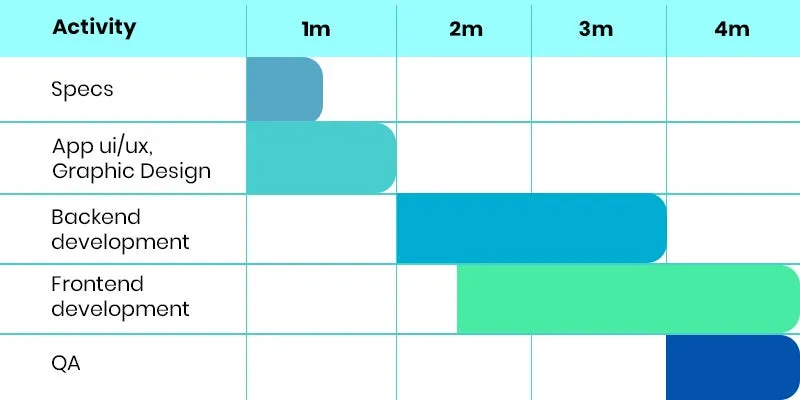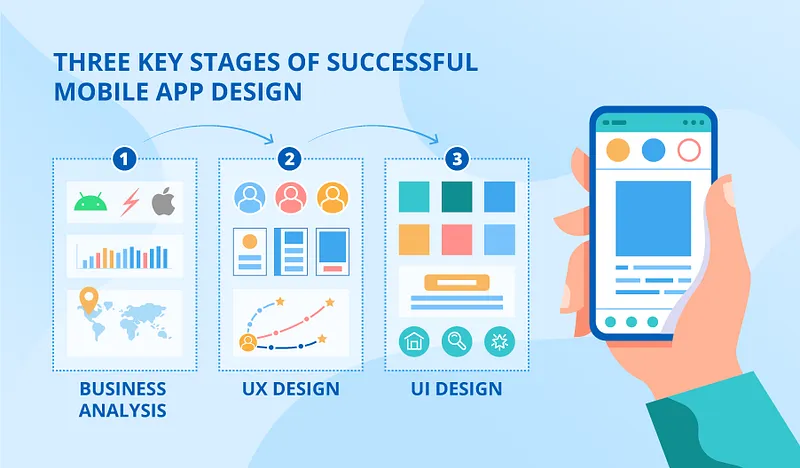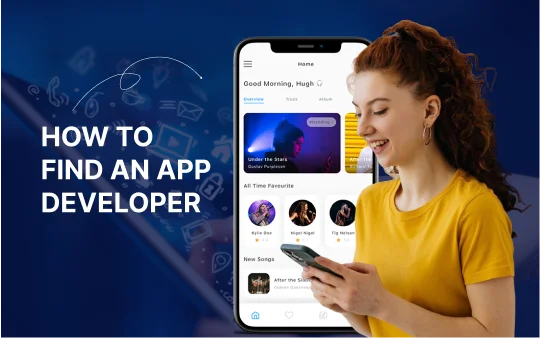3.96 billion dynamic mobile app users globally. Businesses are competing for attention in an ever-changing marketplace driven by new technology and customer demands; specifically, with the demand to develop apps rapidly increasing year after year, you took a closer look at how your company can harness this trend; into a success!
In fact, the injunction for mobile applications is projected to reach $613 billion by 2025, and it’s high time to take a deep look at every possible factor that impacts this process.
Building an app is interesting because it can take many different forms. Some apps are created quickly with little effort, while other times, you need more time and resources for something that seems almost impossible at first glance!
Hence, the question for today’s discussion: how long does it take to build a mobile app, and how to create your app?
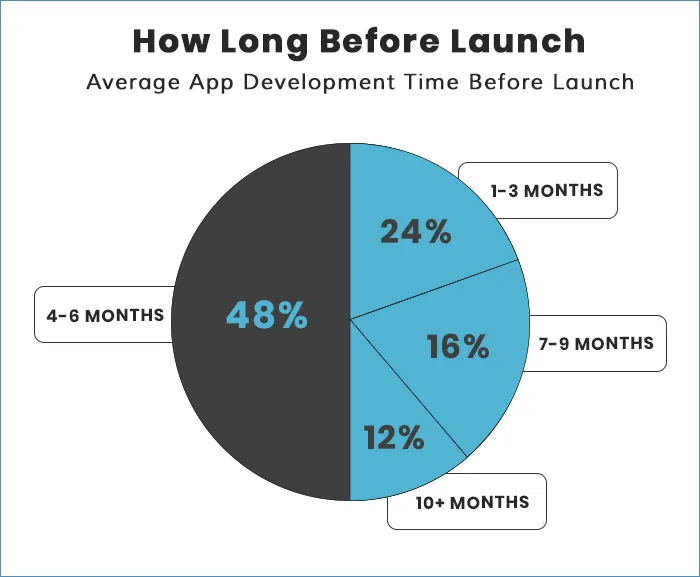
Image Source: MobileAppDaily
Usually, the average time to form an app looks like the above image. But you can never be too sure when it comes to creating an app, as each person and company has its own unique needs. So let’s move further to know more about mobile app development, and it’s time to develop…
The App Development Process: Key Stages to Success
Whether you’re creating an app from scratch for building on an existing idea, the app development process has five main stages — ideation, design, testing, launching, and scaling — allowing you to get your product to market quickly and with maximum effect.
Moreover, applications with diverse sizes and additional features have different app development times. Here, view — how much time it takes to build an app. The image placed below shows the estimated mobile app development time for each stage.
Image Source: Excellent WebWorld
If you skip any of these stages or fail to complete them successfully, your app may be less competitive in the marketplace than it could be. Take the time to consider the potential challenges that each stage may pose for you, and avoid them if possible as you build your app development plan.
Get free consultation and let us know your project idea to turn it into an amazing digital product.
Let’s move further and view each mobile app development stage involved in creating Android and iOS mobile applications.
Stage 1: Idea Generation and Research
Choosing a mobile application idea is one of the most critical steps on your way to creating an app. This can seem challenging at first, but with some practice and guidance, you’ll be able to come up with new app ideas with ease. The best thing you can do is brainstorm as many ideas as possible you can — there’s no limit!
If you need help coming up with ideas, consider using resources like Quora or Reddit. Once you have a solid list of several app ideas, sort them into categories that make sense for your situation.
For example, if you’re looking to create an educational app for kids, it might be helpful to separate these apps by subject (math apps, science apps) and grade level. The more specific your idea is, the easier it will be to market later.
For example, if you’re looking to create an educational app for kids, it might be helpful to separate these apps by subject (math apps, science apps) and grade level. The more specific your idea is, the easier it will be to market later.
Once you’ve narrowed down which idea seems best suited for development as an application based on its potential usefulness and marketability, start thinking about what features should be included in your mobile application.
This stage can take several weeks or months, depending on how complex your app is. The more complex your app, the longer it will take you to get through these stages. For a simple idea, you might be able to go from idea generation to development in just a few days or weeks.
If you’re creating an app with multiple features and a lot of content, you’ll require more time for each step to ensure that everything goes smoothly.
Also Read: The State of UI/UX Design in Mobile App Development
By the end of this step, you should get these outcomes:
- Minimum Viable Product
- User Stories
- App Prototypes
Stage 2: Planning it all out
Your app will only be as good as its foundations. So, don’t rush into development too soon! Take some time at stage 2 to plan your app and think through what it should offer, what it should look like, and why it is unique. This is all about having a solid idea of what you want your finished product to be.
You need a solid foundation on which you can build your app — and you might find that some changes are needed further down the line for everything to run smoothly. So, take some time at stage 2 before proceeding into actual development — or else you could find yourself starting over again in no time at all!
If you’re wondering what goes into stage 2, there are a few things to take care of.
Firstly, think about how much money you want to make from your app. You need a solid financial plan for your business, including estimating your profit margins.
Secondly, think about how long does it take to build a mobile app and how much it will cost.
Thirdly start thinking about which platform, iOS or Android, you will prefer for your app development and which technology AI, IoT, Blockchain, or others you will incorporate to make your app amazing and unique.
And lastly, start thinking about who you might be able to team up with — whether they’re programmers or designers, or people with other analytics and social media marketing skills.
So how long does it take to complete this stage of mobile app development? Well, that depends on your business plan. But you should be aiming for around three months if you want to get a basic version of your app up and running.
Also Read: List Of Top Mobile App Development Frameworks: The Future of App Development
Stage 3: Design & Prototyping
Image Source: ScienceSoft
With a working prototype, you will be able to gauge how your users interact with your product, test different design options, and ensure that various people can use it easily. A well-designed app is not only beautiful but also easy to navigate.
You should also consider developing an app for both iOS and Android platforms at once. It’s much easier (and cheaper) to develop an app for one platform first and then port it over than it is to create two separate apps from scratch.
During prototyping, you may want to bring in a professional designer or hire mobile app developers — but don’t do so until after testing out some designs on friends or family members who fit your target market.
This way, if they have trouble using your prototype or suggest changes based on their feedback, you won’t have wasted money by bringing in outside help too early.
Before final app development, you will also want to finalize your app’s features. You’ll need a combination of key features that are popular and unique ones that make your app stand out from competitors.
Popular features include in-app chat, photo sharing, and push notifications; unique ones depend on your target market. If you have more than one key feature idea, choose just one or two and add others later if you find they are needed.
The important thing is not to overload users with too many options or confuse them by providing duplicate functionality in different parts of your app.
This stage may take several weeks, depending on how many changes you make. However, the more iterations you go through; however, the more time you’ll save in development and testing.
For example, if it takes a week for each iteration of your prototype, but you need three iterations before moving on to app development, that’s three weeks — or nine weeks total.
However, if it only takes one week per iteration and you need three iterations before moving on to app development, that’s only three weeks — saving six weeks!
Stage 4: Mobile App Development
During development, a talented developer takes your concept and gives it life. You’ll usually have at least one face-to-face meeting per week to discuss details. This is where you work out any potential kinks in your idea and make sure everything from features to the user experience will be what you want it to be.
Sometimes these meetings feel like brainstorming sessions where you’re throwing out ideas and seeing which ones stick; other times, things will feel more structured. Whatever happens, your mobile app developers should always give you solid feedback that lets you decide if an idea is worth pursuing or not.
The mobile app development stage mainly includes:
Fron-end development
Back-end development
Front-end refers to a graphical user interface (GUI) that is more interactive and intuitive, making it easier for users to use. Moreover, front-end development includes an app’s design, color scheme, logo and branding, animations or transitions between screens or menus, etc.
Back-end refers to how data is handled behind the scenes by developers. This includes processing information, storing data, integrating with other systems, etc.
The back-end of an application will be most important for business apps as they often require complex processes that must run smoothly for an app to work correctly.
The development stage is one of the long stages in an app’s life cycle. Depending on how complex your app is and how many developers you need to work on it, it can take a few months to a year or more.
During development, you’ll want to check in with your developer regularly and make sure they’re meeting all your expectations.
If something isn’t running right or if you have any questions, it’s best to bring them up as soon as possible to work together on finding solutions.
To keep track of everything that happens during mobile app development, it helps to have a project manager who will be able to organize tasks and keep everyone involved updated on what’s happening at all times.
Stage 5: Testing, Bug Fixing, And Submission
After spending weeks or months building your app, you’ll want it out into the real world as soon as possible. This stage is all about getting feedback on how it works and how you can improve it.
You may even decide to make changes based on some of these ideas, though ultimately, most mobile app developers want to get their app onto as many devices as possible.
There are a few ways you can do testing, including using beta testing sites like TestFlight and BetaBound. If you choose to take that route, remember to be open with users about what they’re signing up for.
They should know what kind of experience they can expect from an early version of your app and whether there will be bugs needing fixing.
Also, keep in mind that once you submit your app for review, Apple has 30 days to approve it before it goes live in the App Store (unless there are significant issues). Moreover, if you’re planning to launch an Android app, note that Google Play also has its submission process.
The good news is that Google tends to have a faster turnaround time than Apple does; however, it’s also more challenging to get your app approved because Google doesn’t let just any developer publish apps on its platform. In fact, only one percent of submissions make it through!
In completion of this stage, several days to weeks will be spent testing, bug fixing, and submission. The time it takes for an app to go from development into beta testing and then finally onto app stores can vary greatly depending on each project. The more popular your app is expected to be, then the longer it may take for you to get it out there.
Stage 6: Monetization
Monetization occurs during production. The main ways to monetize an app include paid downloads, in-app purchases, and subscriptions. After launching your app, you will be able to see exactly how many downloads and in-app purchases you are getting, which can help you make future decisions regarding monetization.
You may also consider running a free trial for your app or offering a free version of it that contains adverts. This could help increase revenue from advertising and raise brand awareness for your business.
You should also consider employing Google Analytics to monitor user activity on your app and find out where they are dropping off when using it. This information can then be used to improve functionality within the app and make it more user-friendly.
Suppose you have chosen not to offer any in-app purchases or ads with your product. You may want to consider selling it on a marketplace such as Apple’s App Store or Google Play Store instead of creating an entirely new website for users to purchase from directly.
Factors That Usually Slow Down The Mobile App Development Process
Here view the various factors that usually slow down or halt app development. These are some of the most common causes of delay in app development. And they are often effortless to avoid. So, let’s take a glance at them one by one:
Mid-project Changes
Mid-project change is one of the most common causes of delay in app development. And it can occur at any stage of an app’s lifecycle. For example, clients may decide that they want their app to do something else. Or maybe they want a new feature added in. This type of change can be pretty disruptive and add cost and time delays to your project.
The best way to detour these issues is through clear communication and good planning before developing your app. Agreeing on exactly what you are going to build before you start building will help assure that everyone is on board with any modifications made during development.
Unexperienced Developers
Another common cause of delay in app development is inexperienced mobile app developers. This can be a genuine concern if you choose a developer who doesn’t have much experience in your field.
For example, if you are building an app for iOS and your developer has never developed an iOS app before. There is a good possibility that they will run into problems and delays during development.
You need to ensure that your developer has experience with whatever platform or technology you are using for your project. The same goes for any other specialist skills required for your project.
A great way to find out how experienced a potential developer is by checking their online portfolio and seeing what kind of work they have done in the past.
Complex Technologies
The complexity of your app can also have a significant impact on how long it takes to develop.
For example, creating an app that uses complex technologies like augmented reality or computer vision will take longer for your developer to complete. These apps require specialist skills and technology that most developers don’t have.
This means they will need more time and resources to build them. It is worth noting that these apps are becoming more common, so it shouldn’t be too hard for you to find a developer with experience.
Also Read: Guide to Android App Development: Tips, Tricks, and Strategies for Building Successful Apps
How to Sprint Up The Time of Application Development?
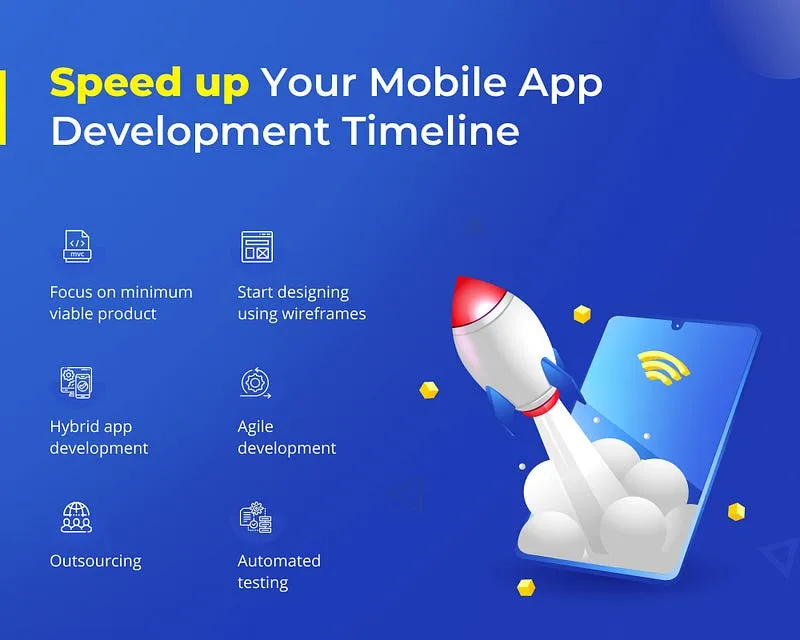
The fastest way of application development is getting it from a real mobile app development company with good professionals working for them because they have all things under control.
You will have different types of apps at your disposal, and you can pick up which one works best for you. All in all, several things can be done to speed up application development in general and make it go more smoothly; some of them are:
MVPs And Prototyping
The idea of MVP (Minimum Viable Product) is a very important one in speeding up mobile app development because it allows you to get something out there that real people can use. It will enable you to test your concept, find flaws, and fix them without spending too much time creating something that may not work.
Prototyping is also important because it allows you to create an actual working version of your application that can be tested with real users before starting full-scale development. This will help you speed up things considerably and ensure that what you’re doing makes sense.
Hire A Professional Developer
Many people think that they can do it all on their own and don’t need help from others. However, if you want to speed up things, you should hire mobile app developers. Because they will get things done much faster than you would be able to do them.
Agile Development
This is another great way of speeding up mobile app development. It allows you to create a working version of your application as soon as possible. It also helps you test things out, make changes, and fix bugs quickly, which you need when trying to speed up things.
White Label Solutions
When you’re trying to speed up mobile app development, it’s good to go with white label solutions. It is because they will allow you to get a working version of your application much faster.
A white label solution is an existing application that has been modified for something else. This means that you don’t have to spend time creating everything from scratch and can use something that already exists.
Automated Testing
When you’re trying to speed up mobile app development, it’s good to go with automated testing. Because it allows you to test your application without using it. This is superb because it will allow you to test things on a very large scale and ensure that everything works as intended.
Get free consultation and let us know your project idea to turn it into an amazing digital product.
Ending Words
Many things can hamper the app development tasks, but you can get your business work done on time if you make a proper strategy and follow all the things properly.
Moreover, certain things can also help your business speed up mobile app development. Still, for that, you need to ensure that you’re doing everything to get a working version of your business application, and this you can be done by following the parameters described in the blog.
Thanks for reading! We hope this blog assisted you in knowing — ‘how long does it take to build a mobile app’ and what are some of the ways you can speed up the process!
Please feel free to reach out to a reliable mobile app development company (ValueCoders) if you have any further queries. You will clearly understand the entire mobile app development process and more. Good luck with your app development journey!
FREQUENTLY ASKED QUESTION
Which are the best platforms to develop leading mobile apps?
There is no one-size-fits-all answer to this question, as the best platform for developing leading mobile apps relies on several factors, including the type of app you want to create, your budget, and your skillset.
However, some popular platforms for developing leading mobile apps include iOS, Android, Windows Phone, and BlackBerry.
What is the average cost to develop a leading mobile app?
The average cost to develop a leading mobile app depends on many factors. It mainly includes the type of app you want to create, the features you want to include, and the platforms you want to support. Generally speaking, the more complex your app is, the more it will cost to develop.
How should I calculate the success of the business app?
Calculating the success of the business app depends on several factors. It includes your goals for the app and your target market.
However, some popular metrics for measuring the success of a business app include download numbers, active users, and customer satisfaction.
What are some common mistakes when developing a mobile app?
Some common mistakes when developing a mobile app include failing to test the app before launch properly. Furthermore, it involves not having a clear monetization strategy, and not considering scalability from the start.
Additionally, it’s crucial to ensure that your app is well-designed and user-friendly to avoid frustrating potential customers.


